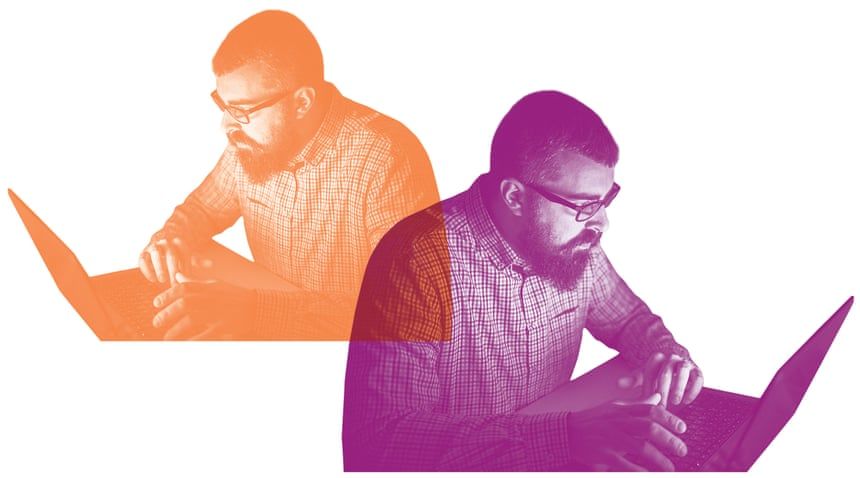
‘It’s the biggest open secret out there’: the double lives of white-collar workers with two jobs
Second jobs can be incredibly lucrative – just ask any of the MPs who gained at least £6m collectively from their side gigs since the start of the pandemic. But it’s not only MPs benefiting from second jobs: ordinary white-collar workers have been getting in on the act. And these workers aren’t just taking on positions that might require a couple of days’ work a month. Instead, they are juggling several traditional full-time jobs, and keeping each one a secret from their other employers – leading, in effect, multiple lives
Among them is Jamie, a 25-year-old based in the UK. Over lockdown, Jamie found himself spending a significant amount of each working day playing video games. His role as a software engineer is undemanding and barely monitored by his company. It allowed him to live comfortably, but he was on what he considered a modest salary.
Eventually, a thought occurred to him: what if he could put that spare time into earning more money? After noticing a rise in remote job vacancies amid lockdown, he decided to apply for a full-time role in software development without giving up his software engineering.
A few months into working at both jobs, Jamie has managed to keep his double life a secret from both his bosses and is now making twice his original salary. “It was way easier than I thought it would be,” he says. “Both companies have very low expectations, so I’m not really struggling to get away with two jobs.”
 Side hustler … ‘overemployed’ workers have a growing online community.
Side hustler … ‘overemployed’ workers have a growing online community.
The boom in remote working brought on by the pandemic, in which the proportion of people working from home almost doubled between 2019 and 2020, has led to a rise in online communities of workers such as Jamie who moonlight in more than one, and in some cases as many as four, full-time occupations. Jamie is part of a growing online community of “overemployed” workers which functions much like a support group for those who have taken, or plan to take, the leap into overemployment.
The community was founded by 37-year-old Isaac, a tech worker in the US, in April, when he launched overemployed.com: a site with articles extolling the benefits of having more than one full-time job and offering advice on everything from filing US tax returns to keeping managers’ expectations low. There’s also a subreddit forum, r/overemployed, and Discord (an instant-messaging platform where users can voice chat with members of different communities, called “servers”) group boasting 6,500 members, where users share experiences anonymously.
Isaac started looking for other jobs after hearing about lay-offs in his company. After successfully landing a new job while holding down his primary occupation, he realised he could do both – and raise his salary from $160,000 (£120,000) to a combined $340,000, he claims. “Doing two remote jobs at once was already happening; it was the biggest open secret out there in tech,” says Isaac, who has been overemployed for more than a year now. “The pandemic just accelerated the trend, and made the environment more friendly to not just tech.”
Taking on side hustles is a common feature of modern employment, particularly for gig workers who scrape together a living via apps such as TaskRabbit and Uber. But working at separate full-time jobs remotely is controversial, and carries specific risks. From a tax standpoint, overemployment is technically legal in the UK and the US. In the UK, having a second job could change a worker’s tax code, but this wouldn’t explicitly be flagged to the first employer’s payroll department as a second job and would probably go unnoticed in larger companies. In the US, it’s simpler, as the country’s tax system is based on the principle of self-assessment and voluntary reporting.
 Always on … some overemployed workers feel that as long as they meet employers’ expectations, they should have no misgivings.
Always on … some overemployed workers feel that as long as they meet employers’ expectations, they should have no misgivings.
However, overemployment could violate contracts or “non-compete” agreements. Getting caught could cost someone all their full-time jobs and potentially make securing another job in the future more difficult. Overemployment can thus be fraught: “I had a panic attack on my first day of working two jobs,” says Callum, a UK finance worker in his mid-20s. “Then I just had to toughen up and get on with it.
Such arrangements are clearly very different from the second “jobs” that some MPs engage in, but overemployment can nonetheless raise ethical concerns for workers, given that an additional job could support someone else. It’s partly why Sam, a 23-year-old US worker, ended up giving his third job to his sister, who was struggling to find work. “I just gave her my corporate login and told her what to do,” he explains. “I attend the meetings to show my face, and she would do the bulk of the work.”
Others say they feel guilty about deceiving their bosses. Yet there is a widespread feeling among overemployed workers that provided they meet employers’ expectations, they have no reason for misgivings. “I want my family to live comfortably, and I’m not exactly gambling or boozing. If both companies are happy with my performance, why should I feel guilty?” wrote one overemployed worker on Discord. Others are quick to cite the misplaced loyalty workers may have towards their employers. As another worker wrote on Discord: “They do not feel bad about replacing you in a second.”
 Juggling acts … clashing meetings can be an issue for overemployed workers.
Juggling acts … clashing meetings can be an issue for overemployed workers.
While some remote jobs lend themselves to overemployment more than others, it’s almost inevitable that there will be clashes. Simultaneous meetings are a problem overemployed workers often encounter, as are training and inductions, which can be particularly demanding on a worker’s schedule. “You have to either be muted on both and without a camera or act like you can’t attend one of them because you are super busy,” explains Jamie of how he gets around meetings. “I haven’t run into any problems, it’s quite chill.”
For one worker, trying to juggle two meetings on mute backfired when both started asking him questions and he unmuted the wrong microphone to speak. “I didn’t blow it, but I freaked,” he said in a Discord post. Most agree that the key to avoiding such panics is making sure that at least one of the jobs is undemanding. If not, overemployment becomes virtually impossible.
Isaac maintains that the chances of getting caught remain low, especially when workers take recommended precautions, which range from using separate computers across jobs to creating fake profiles. But there is the occasional horror story. Damien, in the US, ended up losing both his full-time jobs because his “J1” boss was good friends with his “J2” and his name came up in a conversation between them. “It went south fast as my employment agreements had ‘no J2 clauses’,” Damien explained in a post on Discord. Some overemployed workers have taken to using different nicknames at separate jobs to prevent debacles such as Damien’s.
It might seem surprising that amid the so-called “great resignation”, in which a deluge of workers change or quit their jobs in pursuit of leisure, that people would actively be seeking out more work. Isaac is keen to stress that “overemployment is not overwork” – and many overemployed workers seem to agree. “It has definitely been less stressful this way and way more refreshing for my mind to be constantly busy,” says Jamie.
Callum describes it as a “way for workers to take control of their lives and not need to be subservient”. He adds: “The nine to five is officially dead. Companies can accept this and give us freedom.” Others are seizing on overemployment as a chance to optimise their skillset, or to explore other professions.
On his site, Isaac frames overemployment as a means of earning more now in order to achieve financial freedom later down the line. But Phil Jones, author of Work Without the Worker: Labour in the Age of Platform Capitalism, is sceptical about this. “Sacrificing one’s time for a payoff later is a promise that capitalism has made since the 19th century, and has only been realised for a rarefied few,” he says. In the context of a pandemic that has wreaked havoc on people’s livelihoods, that promise rings even more hollow.
Jones also questions the idea that overemployment is a way for workers to regain control. “Work tends to offer an illusory sense of control in a world which often seems to be spiralling out of control,” he says. “It demonstrates, in quite a stark fashion, just how much work colonises our imagination [and is] symptomatic of a society-wide addiction to work.”
For the overemployed worker: “Time off work doesn’t really seem to be given over to other leisure pursuits. Instead, when people are given more time each day, when they can get away with not working, what do they choose to do? To work more, to earn more.” Jones points to the fact that overemployed workers tend to represent a more financially secure demographic – such as tech employees, whose skills are in higher demand – and are therefore not necessarily people who need to work more, but are choosing to.
Of course, this isn’t true of the entire overemployed community: Katya, 47, from Northern California, felt pushed to take on another job when her son died and the hospital bills she was left with plunged her into debt. “I couldn’t even put my next son in college, and it broke my heart,” she says. After being approached by other companies on LinkedIn, she decided to go for interviews for a second job in payroll, and was successful.
This started six years ago, long before Katya discovered the overemployed community: “I thought I was the only one doing it and for a while felt really bad,” she recalls. “But I could finally pay my bills and get food without worrying about what else I needed my money for.”
 What does overemployment signal about the future of work?
What does overemployment signal about the future of work?
Yet it is inescapable that this kind of “overemployment”, based as it is on remote working, is out of the reach of many lower paid workers. An Office for National Statistics survey found that home working was concentrated in affluent parts of London with more than half of managers, directors, senior officials and professional staff working in this way, compared with fewer than 10% of cleaners, factory workers and drivers. Lower-wage jobs, even when they are remote, are more likely to be subject to heavier surveillance, making overemployment impossible. Call centres, for example, have been accused of intrusively monitoring home workers during Covid-19.
“The fact that some people can choose to enjoy multiple jobs and make more income than any one person could possibly need, while others are forced to take on multiple jobs to make ends meet – and even then struggle to survive – demonstrates that the labour market is becoming increasingly irrational and lopsided,” observes Jones. “Without a significant change in the culture of work via policy or through a stronger labour movement, the labour market is going to become increasingly polarised between the over and the underemployed.”
What, then, does overemployment signal about the future of work? “One way overemployment might be tackled by particularly zealous employers is by paying workers per project as opposed to taking on full-time staff,” says Jones. He suspects that higher-wage, white-collar jobs will increasingly be “parcelled out” in this way, such as the accountancy and translation jobs advertised on platforms such as Upwork. This is supported by a recent report from the Future of Work Institute, which says that bosses are increasingly looking to jettison full-time staff in favour of gig workers who can complete on-call assignments.
In this sense, overemployed workers might be seen as canaries in the coalmine of an increasingly fractured world of work. Indeed, it may well be the case that the nine-to-five as we know it is dying out. But if what emerges in its place solely benefits a subsection of white-collar workers, it risks replicating and entrenching existing inequalities.










